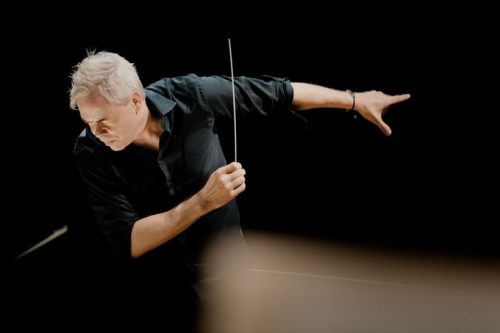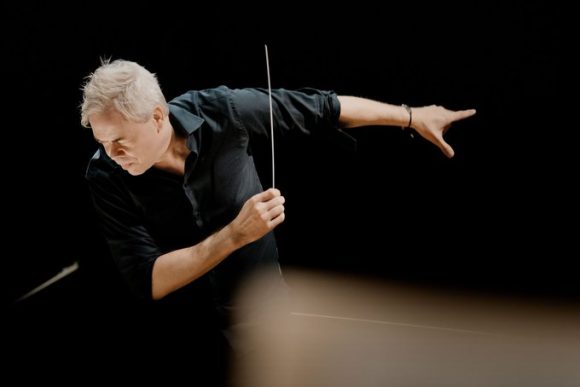 United Kingdom Rands, Prokofiev, Stravinsky, Adams: Alexander Malofeev (piano), BBC Symphony Orchestra / Hannu Lintu (conductor). Barbican Hall, London, 16.2.2023. (MBr)
United Kingdom Rands, Prokofiev, Stravinsky, Adams: Alexander Malofeev (piano), BBC Symphony Orchestra / Hannu Lintu (conductor). Barbican Hall, London, 16.2.2023. (MBr)

Bernard Rands – Symphonic Fantasy
Prokofiev – Piano Concerto No.3
Stravinsky – Song of the Nightingale
Adams – Slonimsky’s Earbox
There are times when the programming of a concert makes sense – and then no sense at all. This was to some extent applicable in both instances in this BBC Symphony Orchestra concert conducted by Hannu Lintu.
In the first half we had the delayed UK premiere of Bernard Rands’ Symphonic Fantasy. Co-commissioned by both the BBC SO and the Boston Symphony Orchestra in 2019 this work was postponed because of the pandemic and subsequently premiered in Boston in April 2022. However, Symphonic Fantasy did not sit at all well with the second piece in the first half, Serge Prokofiev’s spiky Third Piano Concerto – especially when it was played with such unusual freshness by the young Russian pianist Alexander Malofeev.
Rands’ work is partially inspired by the final symphony of Jean Sibelius, his Seventh. That they share a similarity in structure (they are both in a single movement, although you can clearly hear the outlines of Rands’ three principal sections) may well be the only thing they do have in common. There is nothing that is less than remarkable about Sibelius’ C major symphony – itself perhaps a symphonic fantasy. The flexibility of tempi is astonishing for a single-movement symphony, as is the subtle shifting of key – a notoriously difficult one at that. What really differs between the two works is that sense we get of climactic volume and intensity – it is there in Sibelius; it is rather dissipated or lacking in Rands.
His choice to write for a relatively large orchestra but to do so in such a restrained way looked a century or two before the Sibelius into more Classical territory. But if Symphonic Fantasy had opened on a promising theme of timpani, low double basses and cellos it never really evolved from there into anything that gripped the listener. What could have been elemental never developed in a similarly powerful fashion and it was striking how long the work became as its lack of invention turned into predictability. If we get a notable dissonance and sudden abruptness at the end of Sibelius’ Seventh it came as little surprise that Rands’ Symphonic Fantasy just seemed to slide aimlessly to its close. As well played as the performance was it never quite sounded convincing, however.
Prokofiev’s Piano Concerto No.3 is also, as it happens, a C major work and equally as singular and brilliant as Sibelius’ Seventh Symphony. If it is less dissonant than the Second Concerto there is ample room in the Third for playing that can be absolutely primitive – but also, for a clever and intuitive soloist, expressively romantic. I have certainly heard many performances of this concerto which exploit the solo part as a vehicle for heroic virtuosity; what was a complete surprise here was how Alexander Malofeev almost went out of his way to do quite the reverse.
There is much agile brilliance in the first movement (it is rare to find any concerto with so much over-hand playing as Prokofiev writes for his soloist here) and the delicacy of Malofeev’s sound wasn’t just in his dexterity – it also came from beautiful contours of fingering on the keyboard, and a wonderful sense of tone and pedalling. When he needed to turn to a more brutalist way of playing, with thundering chords, they weren’t simply done with naked aggression. In a battle with the orchestra if it didn’t seem exactly understated then it seemed a little more civilised than blood thirsty. Rather telling was the singular lyrical section of the first movement; with the bassoon, clarinet and piano sounding like a trio this had both unusual warmth and compelling drama.
Malofeev was gorgeous in the second movement, too – a set of Themes and Variations. Trills in the first of the Variations were almost jazzy (if not perhaps the Gershwin of the final movement), the moto perpetuo playing of the second Variation dazzlingly agile. Some pianists can be very straight, even inflexible, in the angular accents that form the third Variation, but Malofeev was rather soft-edged – a different way of looking at the music, but in keeping with the more lyrical way in which he presented it. It had considerable logic when the Chopinesque fourth Variation appeared – and that itself disappeared from a nocturnal moodiness into his staggered double octaves and swelling arpeggios that form the first section of the final Variation. Much in this movement of contrast had seemed magical as if sunlight were being refracted through a glass pyramid.
The Allegro ma non troppo was remarkable for being both dazzling and yet understated. Some pianists treat this movement as if they are chopping meat with a cleaver; Malofeev was almost Tsarist in the elegance of his playing, robed in ermine rather than a butcher’s apron. He plays chords with such balanced hands they never sound clunky; and he plays scales that shake like crystals rather than rattle like bones. Perhaps one might have preferred a slightly more savage attack here and there, especially at the climax of the movement, but this is purely a matter of interpretation and not of taste. What was never in doubt was the soaring Romanticism of the rhapsodic section – it was sensationally done. The closing pages were dazzling. The BBC SO under Hannu Lintu were never less than perfectly in tune with their soloist.
An inspired encore – Mikhail Pletnev’s arrangement of the ‘Pas de Deux’ from Tchaikovsky’s Nutcracker Suite No.7 rounded out what was a superlative performance by Alexander Malofeev. Russian pianists can sometimes be hit-and-miss. Malofeev is one of the finest I have heard for quite some time.
The two works after the interval – Igor Stravinsky’s Song of the Nightingale and John Adams’ Slonimsky’s Earbox at least had a common thread if the first had lacked it completely. This is music that suited the BBC SO exceptionally well – Stravinsky’s re-writing of his original ballet (more akin to the Firebird) changed into something approaching what would become his later style. The nightingale was exceptionally well characterised by the orchestra’s flute (Michael Cox) and piccolo (Diomedes Demetriades) players – but this is a work replete with orchestral solos throughout it and the BBC SO players were captivating. Hannu Lintu managed to give us a narrative that was convincing, as well as making the experience of hearing it a rather dark one.
John Adams’ Slonimsky’s Earbox could almost have been an extended movement of the Stravinsky, but it is Nicolas Slonimsky’s book, Thesaurus of Scales and Melodic Patterns, that really connects Adams to the title of the work and to Stravinsky. Common to both works is a sense of colour, of musical shape and form and of sound – but it is the use of scales that Adams amplifies through his quarter-of-an-hour work that perhaps brings it closer to Stravinsky. Lintu pushed the BBC SO into giving a performance that was bristling with vivaciousness, energy and dashing virtuosity. If the strings were sometimes richer in tone than they were in the Stravinsky there was no question that the woodwind were as acerbic and brittle.
This concert is on BBC Sounds until 16th March.
Marc Bridle

Dear Marc Bridle, thank You very much for your thoughtful review. I greatly appreciate
your real professional understanding and love of music and detailed attention to performance.
In his diaries Prokofiev mentions his dislike of unreasonably percussive execution of his piano works.
If one listens to Prokofiev’s playing Visions Fugitives one (in spite of very poor recording) will hear the refinement, touching delicacy, playfulness and whimsicalness, which is not even remotely reminiscent of a lumberjack approach.
There is very interesting comment Prokofiev makes about Rachmaninoff’s performance of his Second Piano Concerto in New York: Sergej Vasilyevich played exquisitely well tonight, without hammering a single nail. Concerto is very beautiful. It’s not a quote but a very close to its meaning. This comment says a lot.
It is difficult to understand why so many good pianists are ignorant of such things. Just listen to his ballet music and God forbid, watch ballets like ‘Romeo and Juliet’ and ‘Cinderella’. Such gorgeousness and incredible connection to the act itself.
I can’t wait to hear Alexander’s performance of Prokofiev’s Second Concerto, which was THE FAVORITE composition of the composer himself (that was an answer to Mstislav Rostropovich’s question at their last conversation in last days of S.S.P’s life).